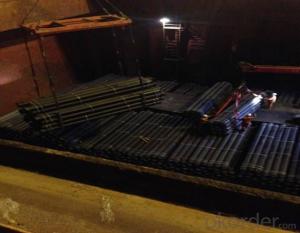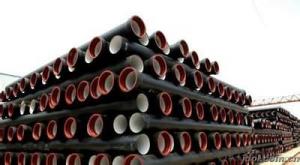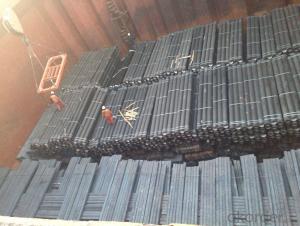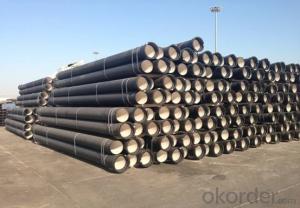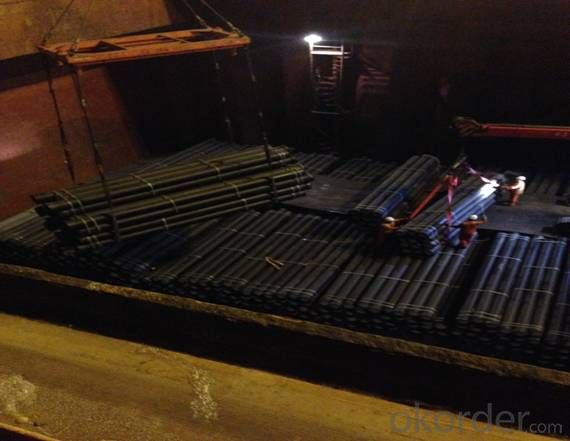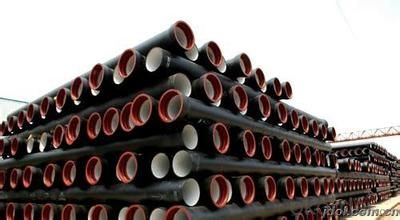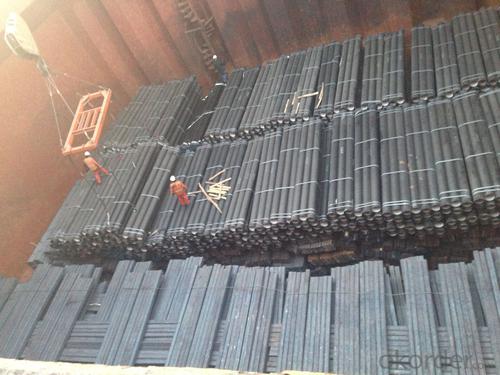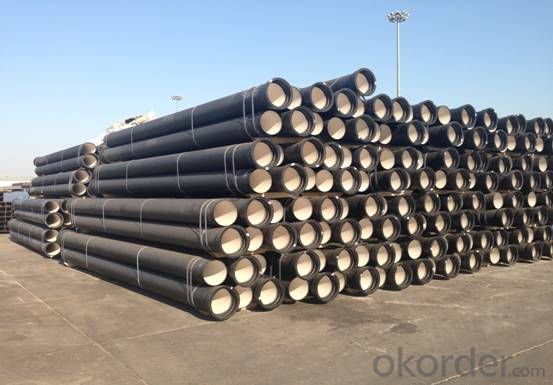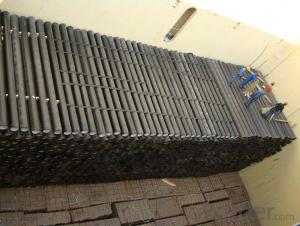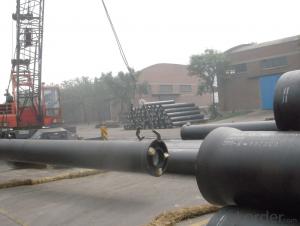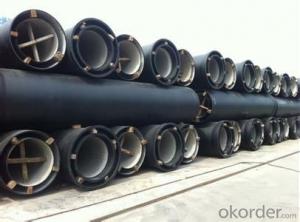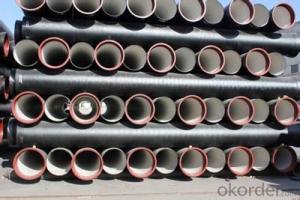DUCTILE IRON PIPE K8 DN500
- Loading Port:
- China Main Port
- Payment Terms:
- TT OR LC
- Min Order Qty:
- -
- Supply Capability:
- -
OKorder Service Pledge
OKorder Financial Service
You Might Also Like
Ductile Iron Cast Pipe is without any defects compare with tradition casting tech, which has many advantages particularly as follow:
(1) High density. In the "vertical upward casting" process, the melt iron of centre liquid column in center crystallizer is continuously feeding for volume shrinkage caused by condensation tube at outer circumference , which lead to be free of shrinkage porosity.
(2) High purity. When melt iron pouring, the mixed impurities such as gas, dross, sand grain which are lighter than melt iron could be eliminated at furnace mouth, its impossible to enter into the crystallizer through the channel, so the melt iron into the crystallizer is very pure.
(3) Strength with toughness. The cooling speed provided by continuous crystallizer is 30 times than sand casting and 5 times than centrifugal casting, and doesn't produce white iron, the eutectic cell volume of continuous cast iron is one eighth to one tenth compare with traditional cast iron. The density of graphite nodule in ductile iron can reach 300-700 pcs/mm2. Therefore, all reason above improve the strength and toughness of continuous cast iron.
(4) Free machining. The high speed cooling make the hardening phase (such as boride, steadite) not appear like reticular, massive or thick, but diffuse like fish bone and pane in shape, moreover, there are tiny graphite flakes inlaid hardening phase. It's free machining in BrinellHardness the range of 250-300HB. However, the Brinell Hardness of 250 is top limit to common metal materials.
(5) Uniform composition of tube wall. The convection mixing of liquid column caused by marching type drawing in crystallizer make the composition of tube wall well-distributed, and concentration gradient very little.
(6) High productivity. To the wall thickness of tube under 10mm, the speed of continuous casting is 1 meter/min, to the wall thickness of tube under 20mm, the speed of continuous casting is 0.5 meter/min, which is high efficiency that centrifugal or other casting tech couldn't reach.
- Q: Are ductile iron pipes suitable for industrial water systems?
- Yes, ductile iron pipes are suitable for industrial water systems. Ductile iron pipes are known for their strength, durability, and corrosion resistance, making them an ideal choice for transporting water in industrial settings. They can withstand high-pressure and heavy-duty applications, making them suitable for conveying water in large-scale industrial facilities such as power plants, factories, and chemical plants. Additionally, ductile iron pipes have the ability to handle a wide range of temperatures, making them suitable for both hot and cold water systems. Their inherent flexibility allows for easy installation and maintenance, further adding to their suitability for industrial water systems. Overall, ductile iron pipes are a reliable and cost-effective solution for industrial water transportation needs.
- Q: How is ductile iron pipe different from cast iron pipe?
- Ductile iron pipe and cast iron pipe are commonly used in plumbing and drainage applications, but they have differences in composition, strength, and flexibility. To begin with, ductile iron pipe is made from a different iron alloy than cast iron pipe. Ductile iron contains more carbon and silicon, which gives it increased strength and durability. On the other hand, cast iron pipe is made from gray iron, which has higher carbon content but lacks the flexibility of ductile iron. Moreover, ductile iron pipe is renowned for its superior strength and resistance to impact. It can withstand higher pressures and is less likely to crack or break under heavy loads or external forces. Cast iron pipe, although strong, is more brittle and prone to fractures and failures. Another significant distinction is the flexibility of ductile iron pipe. It possesses greater flexibility and can endure bending and deformation without fracturing. This flexibility facilitates easier installation, particularly in areas with uneven terrain or where ground movement may occur. In contrast, cast iron pipe is less flexible and more rigid, making it unsuitable for applications that require flexibility. Additionally, ductile iron pipe has a smoother interior surface compared to cast iron pipe. This smoothness reduces friction, enhances flow efficiency, and minimizes the accumulation of sediment and deposits within the pipe, resulting in improved water flow and reduced maintenance needs. In conclusion, ductile iron pipe sets itself apart from cast iron pipe due to its composition, strength, flexibility, and smooth interior surface. Ductile iron offers superior strength, impact resistance, and flexibility, making it the preferred choice in various plumbing and drainage applications.
- Q: How can the ductile iron pipe elbow be fixed?
- The groove connecting pipe consists of two categories of products: sealing function of pipe connections with rigid joint, flexible joint, mechanical three and groove flange; the pipe connections transition of elbow, three links, four links, different diameter pipe, blind plate etc..
- Q: Are ductile iron pipes resistant to alkaline attacks?
- Yes, ductile iron pipes are generally resistant to alkaline attacks. Ductile iron is known for its durability and corrosion resistance, making it suitable for various applications including water and wastewater systems. Alkaline substances, such as high pH levels in water or chemicals, can potentially cause corrosion in certain metals, but ductile iron has been specifically designed to withstand these conditions. Its composition, including the addition of alloying elements like nickel and chromium, enhances its resistance to alkaline attacks. Additionally, ductile iron pipes are often lined with protective coatings, such as cement mortar or polyethylene, further enhancing their resistance to alkaline substances. However, it is important to note that the specific resistance of ductile iron pipes to alkaline attacks can depend on factors such as the concentration and duration of exposure to alkaline substances, as well as the presence of other corrosive agents. Therefore, it is always advisable to consult with manufacturers or industry experts to ensure the suitability of ductile iron pipes for specific alkaline environments.
- Q: Can ductile iron pipe be used for irrigation pumping stations?
- Yes, ductile iron pipe can be used for irrigation pumping stations. Ductile iron pipe is known for its durability, corrosion resistance, and ability to withstand high pressure and flow rates. It is a commonly used material for water supply systems, including irrigation pumping stations, due to its reliability and long service life.
- Q: How does ductile iron pipe resist internal corrosion?
- Ductile iron pipe resists internal corrosion through a combination of its unique material properties and protective coatings. Firstly, ductile iron, also known as nodular cast iron, is made by adding magnesium to molten iron, which causes the graphite in the material to be nodular or spherical in shape. This results in a more flexible and elastic material compared to traditional cast iron, making it less prone to cracking or fracturing under stress. Additionally, ductile iron has a dense, microstructure with a high carbon content, which acts as a barrier to prevent corrosive elements from penetrating the pipe's surface. This inherent resistance to corrosion makes ductile iron pipe suitable for carrying various fluids such as water, sewage, and chemicals without the risk of degradation over time. Furthermore, ductile iron pipes are often internally lined with protective coatings to further enhance their resistance to corrosion. These coatings, such as cement mortar or epoxy, create a barrier between the pipe's surface and the fluid it carries, preventing direct contact and reducing the likelihood of corrosion. These linings are applied during the manufacturing process, ensuring a consistent and durable protection throughout the entire length of the pipe. In summary, ductile iron pipe resists internal corrosion due to its material composition, including the nodular graphite structure and high carbon content, as well as the application of protective coatings. This combination of factors ensures the longevity and reliability of ductile iron pipes in various applications, even in corrosive environments.
- Q: Qianwei County ductile iron pipe which tool to use cutting convenience?
- The cutting of ductile iron pipes is usually done by mechanical cutting, and the working intensity of the machine is stronger than that of our normal workers. This cutting method can effectively reduce the labor intensity of workers, and ensure the quality of cutting. There are many different ways in mechanical cutting, such as sawing, grinding, cutting, and cutting with an electric wire cutter.
- Q: How does ductile iron pipe perform in sandy or unstable soils?
- Ductile iron pipe performs exceptionally well in sandy or unstable soils due to its inherent strength and flexibility. The composition of ductile iron, which includes a combination of iron, carbon, and small amounts of other elements, gives it superior mechanical properties compared to other types of pipes. In sandy soils, where there is a risk of pipe movement and deformation due to shifting ground, ductile iron's high tensile strength and elongation characteristics allow it to withstand the pressure and stress without fracturing or breaking. Its flexibility enables it to accommodate the movement and settlement of the surrounding soil, reducing the risk of pipe failure. Moreover, ductile iron pipe's resistance to corrosion makes it highly suitable for installation in sandy soils. The protective lining and coatings applied to the interior and exterior of the pipe prevent the soil's corrosive elements from attacking the iron, ensuring long-term durability and reliability. In unstable soils with varying compaction levels or weak load-bearing capacity, ductile iron pipe's sturdy construction provides stability and support. Its robustness allows it to distribute the loads evenly, minimizing the risk of pipe deflection or collapse. Additionally, ductile iron pipe's joint design and sealing methods, such as push-on joints or mechanical joints with rubber gaskets, offer excellent leak resistance and prevent soil infiltration, further enhancing its performance in sandy or unstable soils. Overall, ductile iron pipe's combination of strength, flexibility, corrosion resistance, and reliable joint systems make it an ideal choice for applications in sandy or unstable soils, providing a long-lasting and efficient solution for water and wastewater transmission.
- Q: How do ductile iron pipes perform in high-traffic areas?
- Ductile iron pipes perform well in high-traffic areas due to their durability and strength. They have the ability to withstand heavy loads and traffic loads without experiencing deformation or damage. Additionally, their corrosion resistance properties make them suitable for prolonged exposure to moisture and harsh environmental conditions. Overall, ductile iron pipes are a reliable choice for high-traffic areas.
- Q: What is the expected pressure class for ductile iron pipes?
- The pressure class anticipated for ductile iron pipes may differ based on the particular use and project needs. In a general sense, ductile iron pipes are engineered to manage high-pressure situations and are typically offered in pressure classes spanning from 150 psi to 350 psi. These pressure classes signify the utmost operational pressure that the pipe can endure while preserving its structural soundness. To ascertain the suitable pressure class for ductile iron pipes in a specific scenario, it is crucial to refer to industry standards, guidelines, and project specifications.
Send your message to us
DUCTILE IRON PIPE K8 DN500
- Loading Port:
- China Main Port
- Payment Terms:
- TT OR LC
- Min Order Qty:
- -
- Supply Capability:
- -
OKorder Service Pledge
OKorder Financial Service
Similar products
Hot products
Hot Searches
Related keywords
